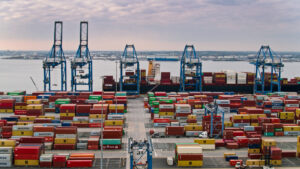
Port of Baltimore closure disrupts supply chain for multiple automakers
By onAnnouncements
The closing of the Port of Baltimore following the collapse of the Francis Scott Key Bridge Tuesday is causing disruptions in the auto industry’s supply chain, multiple media agencies are reporting.
President Joe Biden said the port will remain closed as the Army Corp of Engineers lead efforts to clear the channel.
“It is the top port in America for both imports and exports of automobiles and light trucks,” Biden said Tuesday. “Around 850,000 vehicles go through that port every single year and we are going to get it up and running again as soon as possible.”
Biden said federal resources have been sent to help with emergency response.
Automakers that use the port include General Motors, Ford, Stellantis, Volkswagen, Mercedes-Benz and BMW. Maryland’s Governor’s Office said last month that the port has led the nation in automobile movement for the past 13 years.
“The impact of this incident is going to be felt throughout the region and really throughout our supply chains,” U.S. Transportation Secretary Pete Buttigieg told CNN. “We are talking about the biggest vehicle handling port in the country that is now out of commission until that channel can be cleared.”
Buttigieg said the road to recovery will be “big, long, and not inexpensive.”
John Bozzella, president and CEO of Alliance for Automotive Innovation, also released a statement saying it was too soon to know what the impact would be on the industry but it would cause a disruption.
“We’re in touch with federal officials to help them understand the scale of automotive operations here,” Bozzella said.
Multiple OEMs made statements to the media Tuesday, many saying they don’t expect major impacts.
“We expect the situation to have minimal impact to our operations. We are working to re-route any vehicle shipments to other ports,” GM said in a statement to Reuters.
John Lawler, Ford CFO, told Bloomberg that the company will divert parts to other ports along the East Coast or elsewhere in the country.
“We have experience now in understanding supply chain disruptions,” Lawler told Bloomberg TV. “So we’ll just put that experience to work and figure out the best solution.”
Ford also told Reuters, “Where workarounds are necessary in the short-term, our team has already secured shipping alternatives.”
Stellantis told Reuters it is “initiating discussions with our various transportation providers on contingency plans to ensure an uninterrupted flow of vehicles to our customers.”
In a statement to Politico, Toyota said it would feel some impact, specifically to vehicle exports.
“At this time, we do not anticipate a significant disruption, but we are evaluating the situation closely to determine the longer-term impact and countermeasures,” Ed Hellwig, Toyota spokesperson, told Politico.
Mercedes said that while it uses Baltimore ports, it also depends on ports in Georgia and South Carolina. It doesn’t expect any impact on vehicle exports or parts, according to Reuters.
“We are in close contact with our logistics service providers and are continuously monitoring the situation,” Mercedes-Benz said in a statement to the New York Times. “We have several options available within our flexible supply chain network.”
Volkswagen and BMW told Reuters they do not expect significant impacts as they are both able to ship from the ocean side of the harbor that is not blocked by the bridge collapse.
Volvo told Reuters it was still looking over its U.S. inventory but didn’t expect huge impacts.
Jason Miller, a professor of supply chain management at Michigan State University, told Politico that impacts on the supply chain won’t be as disruptive as the pandemic.
IMAGES
Photo courtesy of halbergman/iStock
